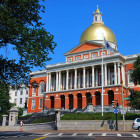Bicycling
OP-ED: State Sen. Brownsberger Pushing to Make Roads Safer for Bicyclists
|
(The following piece was provided by State Sen. Will Brownsberger (D – Belmont) who also represents Watertown and parts of Boston)
When I cycled across the country in 2011, I saw a lot of roadkill. I was constantly aware that all it would take was one mistake by me or by one of those caffeinated guys in big rigs and I’d look about the same. On the open road, I developed a profound gratitude towards the tens of thousands of drivers who did not hit me. The Senate just approved a safety package that would require a clearance of at least three feet for vehicles passing vulnerable road users like highway workers, cyclists and pedestrians. It would add an additional foot of required clearance for each ten miles per hour of speed.

